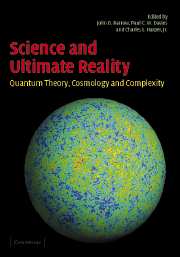Book contents
- Frontmatter
- Contents
- List of contributors
- Foreword
- Editors' preface
- Preface
- Acknowledgments
- Part I An overview of the contributions of John Archibald Wheeler
- Part II An historian's tribute to John Archibald Wheeler and scientific speculation through the ages
- Part III Quantum reality: theory
- 3 Why is nature described by quantum theory?
- 4 Thought-experiments in honor of John Archibald Wheeler
- 5 It from qubit
- 6 The wave function: it or bit?
- 7 Quantum Darwinism and envariance
- 8 Using qubits to learn about “it”
- 9 Quantum gravity as an ordinary gauge theory
- 10 The Everett interpretation of quantum mechanics
- Part IV Quantum reality: experiment
- Part V Big questions in cosmology
- Part VI Emergence, life, and related topics
- Appendix A Science and Ultimate Reality Program Committees
- Appendix B Young Researchers Competition in honor of John Archibald Wheeler for physics graduate students, postdoctoral fellows, and young faculty
- Index
8 - Using qubits to learn about “it”
from Part III - Quantum reality: theory
Published online by Cambridge University Press: 29 March 2011
- Frontmatter
- Contents
- List of contributors
- Foreword
- Editors' preface
- Preface
- Acknowledgments
- Part I An overview of the contributions of John Archibald Wheeler
- Part II An historian's tribute to John Archibald Wheeler and scientific speculation through the ages
- Part III Quantum reality: theory
- 3 Why is nature described by quantum theory?
- 4 Thought-experiments in honor of John Archibald Wheeler
- 5 It from qubit
- 6 The wave function: it or bit?
- 7 Quantum Darwinism and envariance
- 8 Using qubits to learn about “it”
- 9 Quantum gravity as an ordinary gauge theory
- 10 The Everett interpretation of quantum mechanics
- Part IV Quantum reality: experiment
- Part V Big questions in cosmology
- Part VI Emergence, life, and related topics
- Appendix A Science and Ultimate Reality Program Committees
- Appendix B Young Researchers Competition in honor of John Archibald Wheeler for physics graduate students, postdoctoral fellows, and young faculty
- Index
Summary
Introduction
Almost a century after its birth, quantum theory remains odd and counterintuitive. As Richard Feynman wrote, it seems that nobody really understands it. This is indeed true if by understanding we mean being able to explain it using our common sense and everyday experience. The development of some kind of “quantum common sense” has been very slow even though our everyday life is being continuously influenced by technologies whose roots lie in quantum laws. In recent years the growing field of quantum information and quantum computation became a fruitful playground for physicists, mathematicians, computer scientists, and researchers from other fields who developed new interesting ways of storing, transmitting, and processing information using quantum mechanics at its best. Thus, both theoretical and experimental research on multiparticle entanglement, on the manipulation of individual quantum systems, on decoherence, and on the transition from quantum to classical are subjects of interest not only for their basic relevance but also for their potential practical significance as they might be of help for the development of a real quantum computer. Even though this technology may be far in the future, it is interesting to speculate about what lessons on quantum reality could be learned from quantum computation (eg., what would happen if one could operate a quantum computer).
- Type
- Chapter
- Information
- Science and Ultimate RealityQuantum Theory, Cosmology, and Complexity, pp. 138 - 152Publisher: Cambridge University PressPrint publication year: 2004



